Erstellt am: 25. 1. 2012 - 14:02 Uhr
Innsbruck 2012: The question of Legacy
My last web story on the topic of the Winter Youth Olympic Games (YOG) closed quite hypothetically, with the concern that increased competitive pressures could lead young athletes to unhealthy behaviours, such as doping or overworking themselves to win Olympic medals.
The good news? By and large, the athletes who I actually met at the venues, seemed healthy, happy, and to benefit from the experience.
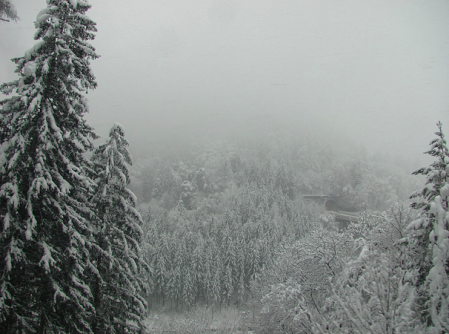
Johnny Bliss, 2012
I had concerns about the health and well-being of particularly some Russian figure skaters I'd seen, based on their insanely choreographed skating performances, and some rather unhealthy-looking IOC-sanctioned photographs. But the truth is - it's all heresy. Rings under the eyes of an athlete potentially signal a lack of sleep and some signs of stress; a stoic expression as they exit the ice, may merely signal that they come from a different culture, with different behavioural customs. To draw any other conclusions from so little input would be journalistically irresponsible.
There is a place for gut feelings as well, mind you; but they should be taken with a grain of salt, and understood as the uninformed first impressions that they are. I had my suspicions, fair enough, but I feel the need to add that I had no compelling evidence to corroborate them.
What I did have was an actual interview, which I made with the Russian figure skater who won the Olympic Gold that day. Her name is Elizaveta Tuktamysheva, and I spoke to her after the day's Victory Ceremonies.
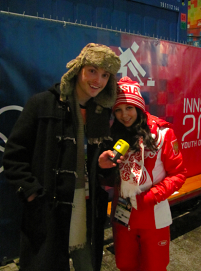
Johnny Bliss, 2012
How many hours do you train every week, usually?
I have ten trainings [up to] fifteen hours.
Oh. That's pretty reasonable. How long have you been doing this?
* - She is 15 now, so she was 4 or 5 years old when she first started ice skating.
At first she didn't understand the question, and it had to be translated into Russian. But eventually, she told me: Ten years.*
Did you feel much pressure, leading up to this competition?
After some hesitation: No, I don't think so. Not much pressure.
* - Source: RT.com
Interestingly enough, while I was doing some research for this article, I stumbled upon a very different quote from Elizaveta, in interview with the Russian-language Sport-Express newspaper.*
I felt this stress all the time, she is quoted as saying. At [...] the ‘adult’ Grand Prix nobody expected particular results from me, so I went out and calmly performed my program. But in Innsbruck, I knew that I just couldn’t fail as I was defending the honor of the country at the Youth Olympics.
As important as figure skating might be for the Russians, I had the feeling the same might be true with ice hockey for the Canadians. I interviewed two Canadian ice hockey players, respectively Joe Hicketts (team captain) and Sam Walsh (goal keeper), who told me that there was an enormous pressure for them to succeed in every match.
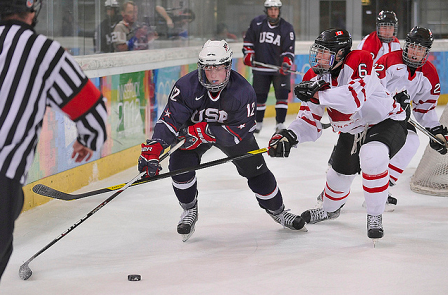
Innsbruck 2012
Sam: There's always pressure. Everyone expects Canada to win Gold in hockey, that's just a given, almost every year.
Joe: Yeah, Gold is Canadian standard. We are here to win Gold.
Still, it is one thing to be under pressure to represent your country, and quite another to be ruining your health to win. A big topic for these Games was the topic of doping. The International Olympic Committee (IOC) funded a Culture & Education Programme to focus on the topic, which included maintaining a booth from the Montreal-based World Anti-Doping Agency (WADA), for the duration of the Games. I arranged an interview with WADA Education Manager Jennifer Sclater, to attempt to gain some insight as to how big of a problem doping actually is for young athletes.
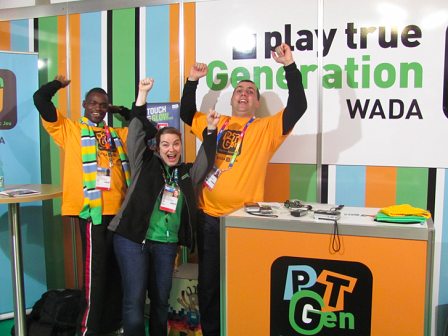
Johnny Bliss, 2012
We found that there were two positive doping cases in Singapore [during the Summer Youth Olympics 2010], and we know from other countries that do tests at a younger level, that they've had positives as well, so we know that these athletes aren't immune to it.
Are you aware of any positives that were found this year?
No. We're not involved in that, and so I can't comment on it.
Would you say in your experience that certain regions are producing more stressed-out, heavily pressured athletes than other regions?
I don't think it's a regional case. I think it [comes down to] individual athletes, and how they deal with this type of competition, so we can't make any kind of generalization.
Because of lowering the age of competitivity, could having a Youth Olympics be a gateway to young athletes getting exposed to some of these more 'adult' considerations (i.e. doping) before they are ready?
For a lot of these athletes, while this is their first Olympic experience, they have experience competing at an international level [at] Junior World Championships, so while the event itself might be new to them, competing at a high level with competitive pressure is not.
Critical Voices from Outside
My last web story featured an interview with a Green Party Parliamentarian for the Tyrolian region, by the name of Gebi Mair. One of very few outspoken critical voices about these particular games, last time we'd discussed his concerns about the human effect of competitive pressure on young athletes (including doping). Since that topic was already covered in my last web story (and above), this second part will focus on some of the more fundamental issues facing Innsbruck as an Olympic host city.
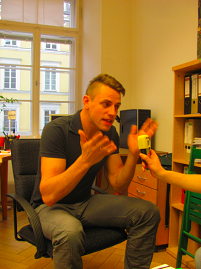
Johnny Bliss, 2012
One of the main topics, of course, is money. There's the official budget of 23.7 million euros, of which at least 15 million euros are paid by taxpayers. [This is because] they didn't find any [major] sponsors, because there's no public attention to the event.
I mean, the IOC had to force broadcasting companies to actually broadcast the Youth Olympic Games. The IOC said, if you want to broadcast London 2012, you have to [play] the Youth Olympic Games too.
The Olympic Broadcasting Service (OBS) is producing the Youth Olympic Games themselves, because they didn't find any other producer for the event. And so in the end, the City of Innsbruck, the region of Tyrol, and the Republic of Austria, are paying for the event.
And it's not only 23.7 million euros, we know that besides the event there are at least another ten million euros [set aside in the budget]. Obviously they were not honest in the beginning, because they knew it would cost that much. Of course, even 35 million euros is not that much. [For the] Summer Youth Olympic Games in Singapore, [just] the opening event cost about this sum. So they tried to do cheap Games here in Innsbruck, but even cheap Games are quite expensive.
Have there been any attempts to protest, and has there been any corresponding clamp down on free speech?
I've heard of one group of people who wanted to protest in the Maria-Theresien Strasse, and police forced them to go away. [They] said, we don't need this at the time of the Youth Olympic Games, but you can do it afterwards. So they took all their personal details, and they had to go.
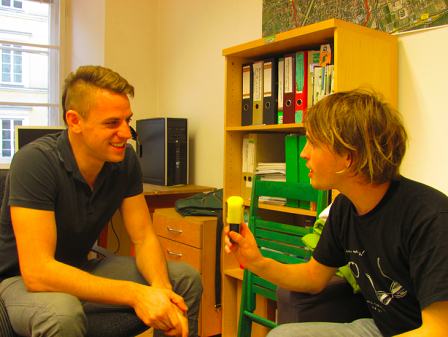
Johnny Bliss, 2012
Innsbruck hosted the Olympics twice before, so there is already infrastructure in place. Therefore, what kind of eco-footprint will these Games ultimately have?
They had one big investment which was environmentally questionable; it is a snow machine at the Patscherkofel, which was newly-installed there. Another question is, do we really need 200 SUVs [brought here] for IOC members [to] drive around the city? To be fair, I think they tried to keep the environmental effects low. It wasn't completely possible, but they tried.
Would there have been a way to do these Youth Olympic Games in a way that a lot of your criticisms wouldn't exist?
In 2005 we had the University Games here in Innsbruck, and they were actually quite comparable, [in terms of] number of participating athletes, and number of functionaries... also, you could compare it with the number of spectators actually. And the University Games in 2005 cost [only] about 8 million euros. So maybe there would have been a cheaper way to do it, but the moment the IOC becomes involved, everybody goes crazy.
Echoes of a Mega-Event
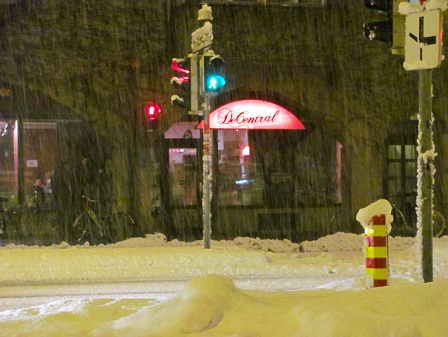
Johnny Bliss, 2012
Following a hot tip from some friends, on Friday night I trudged through what seemed like a couple kilometres of heavy snow to the Cafe DeCentral, an alternative activist-punk rock-squat-style joint in the west of Innsbruck. The reason? I'd heard that a political scientist from Germany, Volker Eick, was scheduled to be there that night, to expound critically on mega-sporting events like the Olympics and the World Cup, whilst using the comparatively minor YOG as a sort of contextual springboard.
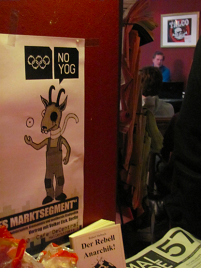
Johnny Bliss, 2012
As I approached the cafe, my eyes fastened on all of these hanging protest banners and signs, complete with angry Olympic mascots declaring "NO YOG. OUR CITY, NOT YOUR BUSINESS", and I was reminded suddenly of some of the alternative anti-Games culture I'd encountered in Vancouver, almost exactly two years previous.
Volker's entire discourse was in German, with the result that I missed some of his more sophisticated points; but because he was speaking about mega-sporting events in general (something I'm rather familiar with), rather than focusing exclusively on the odds and ends of these particular Games, what I did catch sounded quite familiar from ZA and BC.
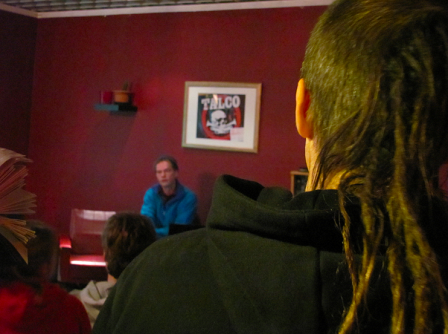
Johnny Bliss, 2012
After he finished his lecture, I asked him what sort of legacy he thought the Youth Olympic Games in Innsbruck would leave in its shadow.
It's hard to speak about the legacy right now, also because these are only the [first ever] Winter Youth Olympic Games. We will have to wait [for the dust to settle], until people have went through the numbers - the money. For the time being, all we know is that the IOC has been experimenting with a new audience, and with new actors: in this case, young people.
--
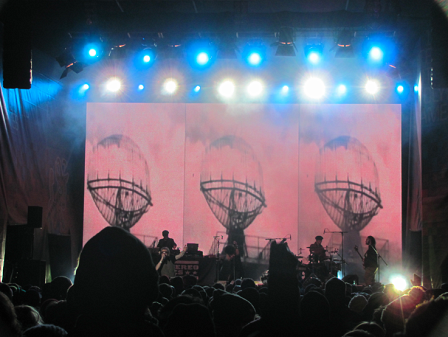
Johnny Bliss, 2012
Listen here to my coverage of the Winter Youth Olympic Games:
Day 1 - I interviewed members of the Cayman Islands Alpine Skiing team, and some random InnsbruckerInnen too!
Day 3 - following a rough 9-0 game of ice hockey between Canada and Austria, I arranged an interview with two members of the Canadian Ice Hockey team, and asked them how they could live with suffering such an embarrassing defeat.
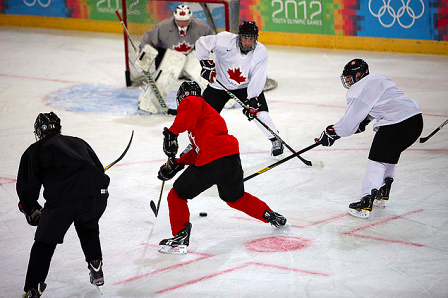
Innsbruck 2012
Day 4 - my first interview with Gebi Mair, the aforementioned Green Parliamentarian.
Day 5 - suddenly fascinated by figure skating, I asked Australian skater Chantelle Kerry to give me some tips.
Day 7 - I asked World Anti-Doping Agency Education Manager Jennifer Sclater about old WWII bombs getting discovered in Innsbruck, and how concerned we should be about young athletes getting into doping.


